Understanding The Mortuary Assistant: Game vs. Reality
The mortuary assistant is both a popular indie horror game and a real occupation in the funeral service industry. Here's what you need to know:
| The Mortuary Assistant | Key Information |
|---|---|
| As a Game | A first-person horror game where players embalm corpses while dealing with demonic possession (Released August 2022) |
| As a Career | A funeral service professional who assists with body preparation, embalming, and funeral arrangements |
| Game Setting | River Fields Mortuary where protagonist Rebecca Owens works |
| Real-World Setting | Funeral homes, hospitals, morgues, and medical examiner offices |
| Game Tasks | Embalming procedures, occult rituals, demon identification |
| Real-World Tasks | Body preparation, embalming assistance, transportation, documentation |
If you're interested in the horror game, it features realistic mortuary procedures blended with supernatural elements. The game became a Steam bestseller, generating nearly $1 million in its first month of release.
If you're researching the actual career, mortuary assistants typically need a high school diploma to start, with further education required for advancement. The median salary for funeral attendants was $29,150 as of 2020.
The game's popularity has sparked interest in the real profession, though the day-to-day reality involves less demonic possession and more compassionate care for the deceased and their families.
I'm Mortuary Cooler, a national-level supplier of mortuary coolers and equipment with extensive experience working with the mortuary assistant profession across funeral homes nationwide. My background includes providing specialized equipment that supports the daily functions of mortuary professionals.
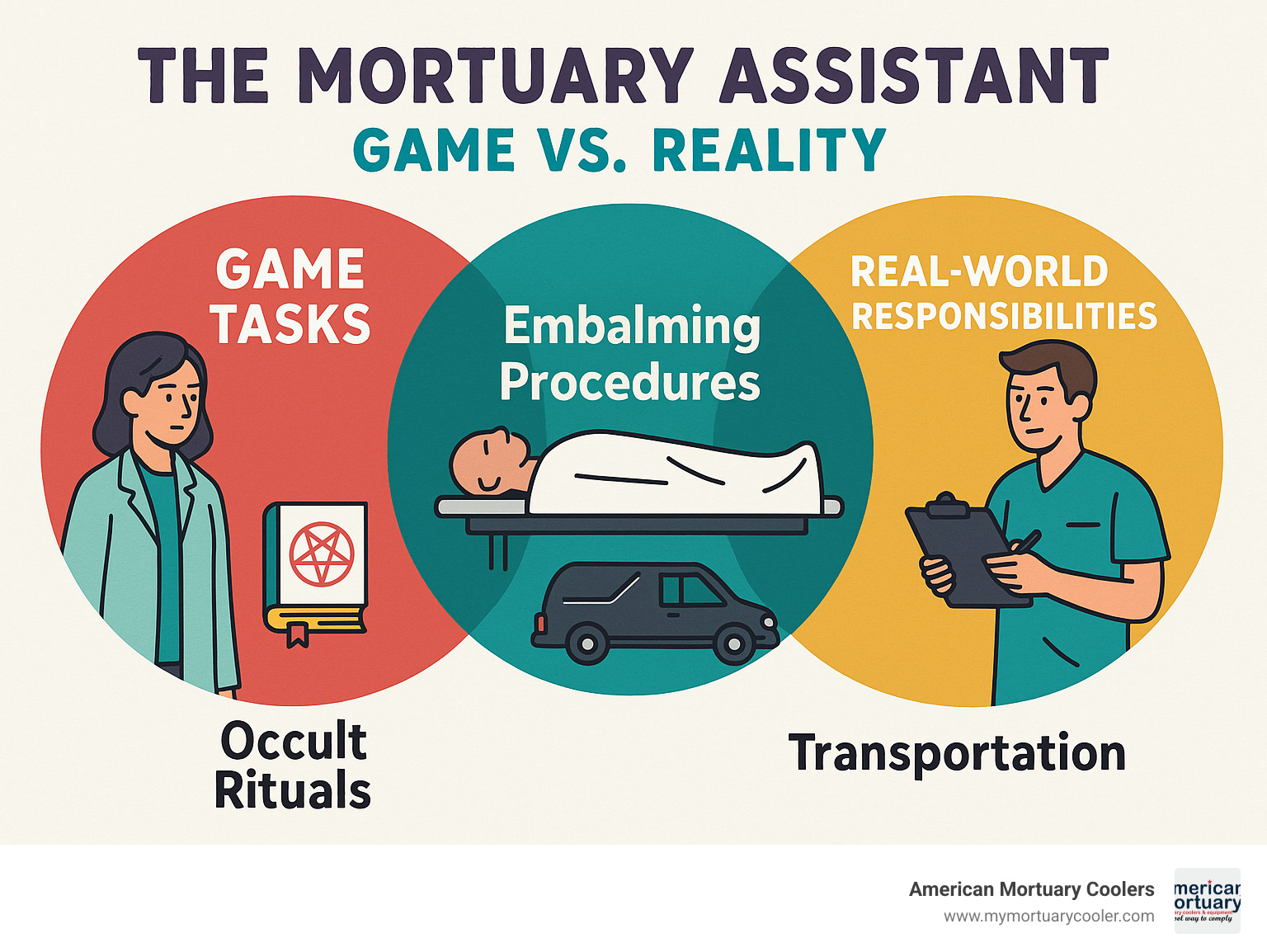
The mortuary assistant terms explained:
The Mortuary Assistant: Game Meets Reality
When the sun sets at River Fields Mortuary, the real work begins. The mortuary assistant game takes players into the shadowy world of Rebecca Owens, a freshly graduated mortuary sciences student whose apprenticeship quickly becomes a battle for her soul.
Developed by DarkStone Digital and released by DreadXP in August 2022, this indie horror gem started on Windows before expanding to Nintendo Switch in April 2023, and PlayStation and Xbox platforms in August 2024. Built on the Unity engine, the game became an overnight sensation, earning nearly $1 million during its first month on Steam.
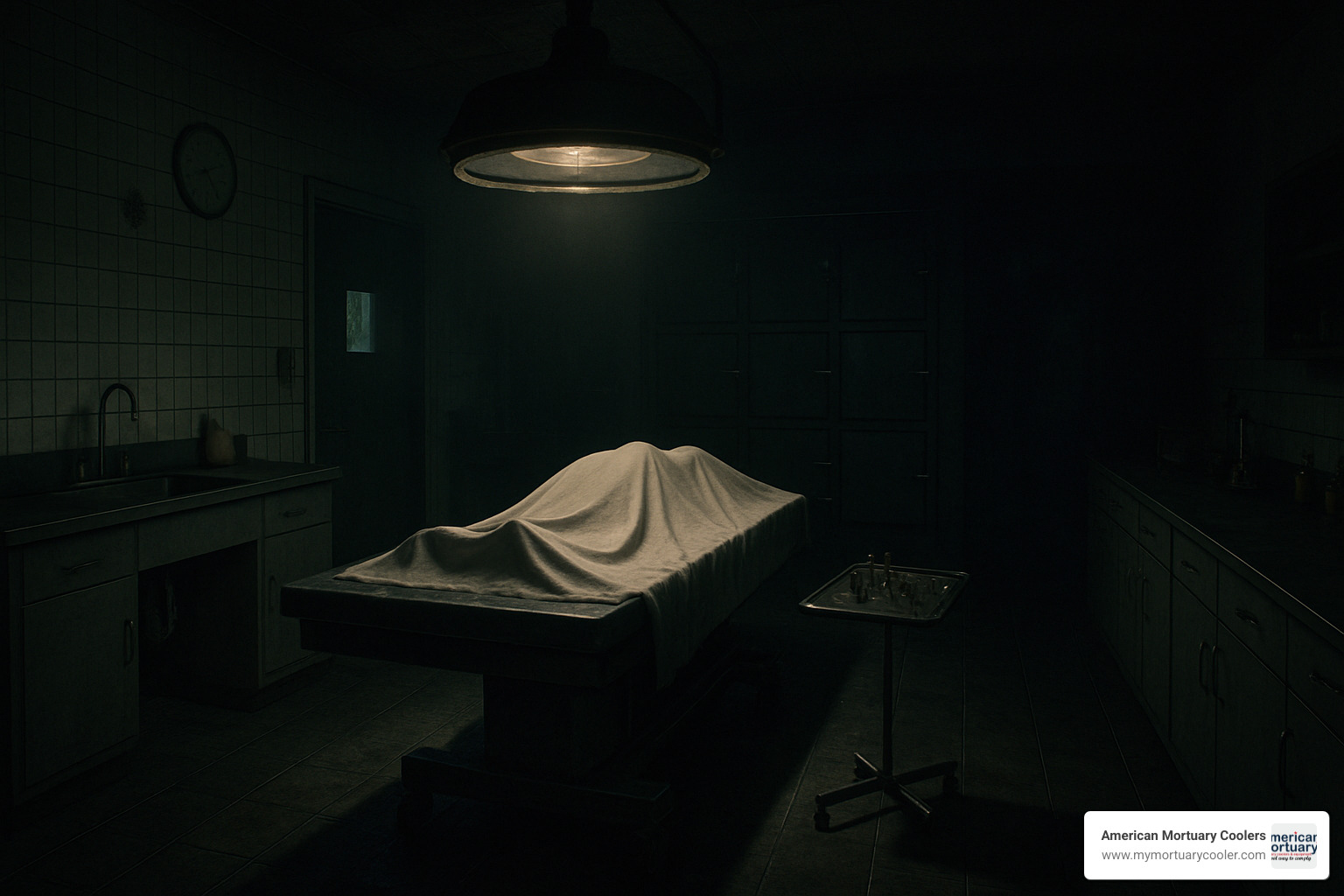
What makes the mortuary assistant stand out in the horror genre is its fascinating blend of authentic mortuary procedures with supernatural elements. Players perform actual embalming steps while detecting demonic possession and conducting exorcism rituals.
| Game Task | Real-Life Equivalent |
|---|---|
| Preparing the embalming table | Standard procedure in mortuary prep rooms |
| Making incisions for arterial tubes | Accurate to real embalming techniques |
| Connecting blood drainage systems | Simplified but based on actual process |
| Identifying demonic symbols | Not part of actual mortuary work |
| Performing exorcism rituals | Not part of actual mortuary work |
| Recording identifying information | Standard documentation procedure |
| Working night shifts alone | Common in the funeral industry |
Gameplay Highlights in The Mortuary Assistant
At its core, the game revolves around a methodical checklist system guiding players through embalming procedures – much like the structured approach real mortuary professionals follow. Each night shift brings new challenges as you prepare bodies while fending off supernatural threats.
The gameplay experience is richly layered, with embalming tasks that require precision and focus. Meanwhile, occult elements have you identifying demonic symbols and performing banishing rituals that would make an exorcist sweat.
What keeps players coming back? The clever randomized scare system ensures no two playthroughs are alike, while cassette tapes scattered throughout reveal Rebecca's backstory and River Fields' dark history.
With "Very Positive" reviews from over 6,000 Steam players, the game's immersive atmosphere has clearly struck a chord. Stuck on a challenging demon? The Steam Support Community offers helpful resources.
How Accurate is The Mortuary Assistant Compared to Real Procedures?
While you won't find demons lurking in actual funeral homes, the mortuary assistant game does incorporate surprisingly accurate mortuary procedures. Developer Brian Clarke conducted extensive research into authentic embalming techniques before adding supernatural elements.
The game gets many technical details right. The incision points for embalming are anatomically correct, and the trocar is portrayed with impressive accuracy. Even the placement of arterial tubes mirrors actual practices, while basic suturing techniques are represented, though simplified for gameplay.
Of course, concessions were made for pacing – a real embalming typically takes 2-3 hours, while the game condenses this to about 10-15 minutes per body.
For those curious about actual tools and equipment used in preparation rooms, our blog on prep room supplies provides a comprehensive overview of what real mortuary professionals use daily.
Becoming a Real-World Mortuary Assistant
Beyond the game, the mortuary assistant is a legitimate career path in the funeral service industry. This profession goes by several titles, including funeral attendant, mortuary technician, and autopsy assistant, depending on the workplace and duties.
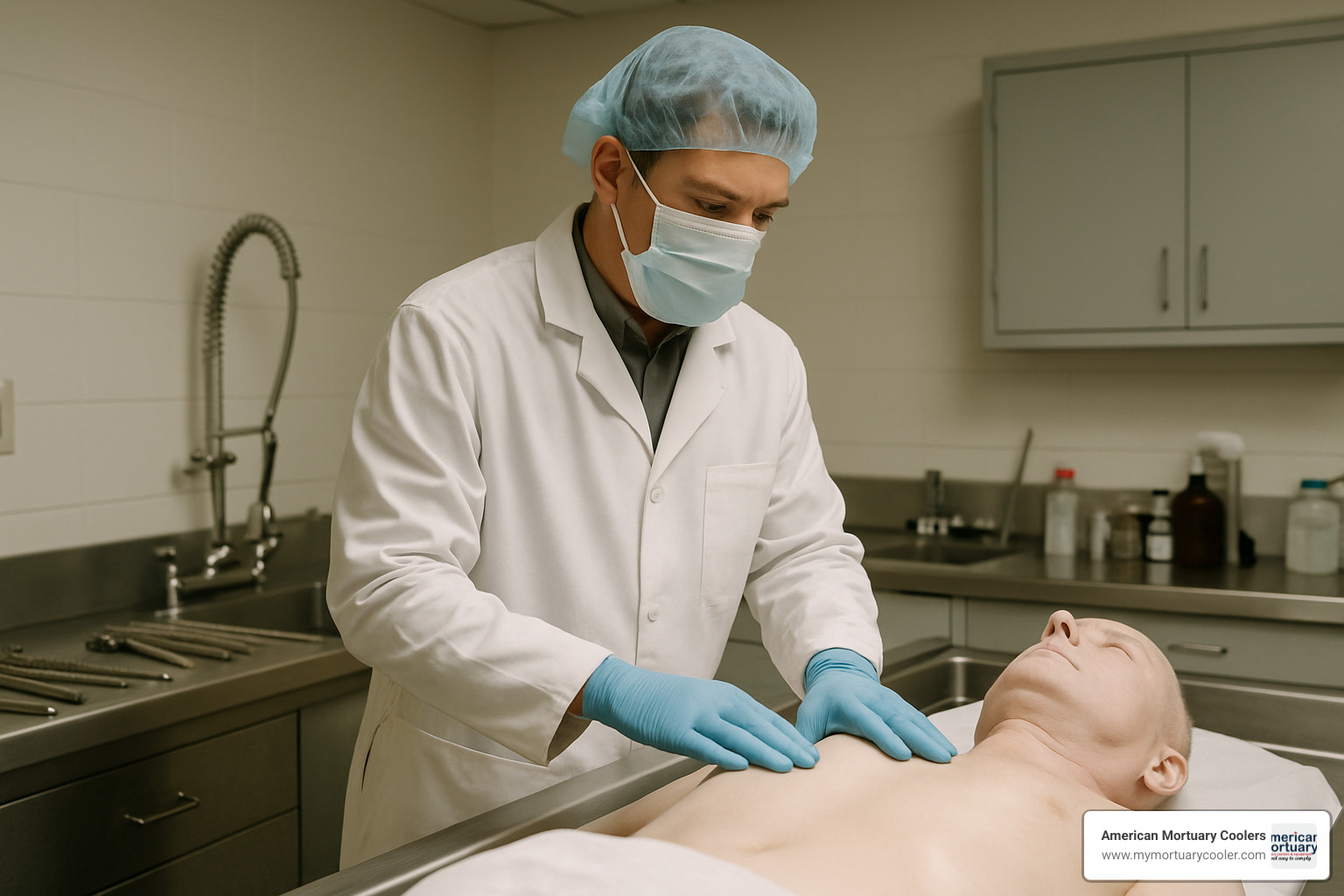
When I visit funeral homes across the country, I'm always struck by the quiet dedication of mortuary assistants. These professionals work behind the scenes, providing essential services that help families through difficult moments. Their scope typically includes assisting embalmers with body preparation, transporting the deceased, and preparing spaces for viewings and services.
Many mortuary assistants also maintain equipment and supplies, provide support to funeral directors, and help with administrative tasks. It's a profession that demands both technical skill and compassion.
To enter this field, you'll need at least a high school diploma, though formal education is increasingly valued. There are about 58 institutions across the United States offering mortuary science programs, many at the associate degree level. These programs are accredited by the American Board of Funeral Service Education (ABFSE).
Education, Licensing & Certifications
The path to becoming the mortuary assistant varies depending on career goals and state requirements. A high school diploma or GED will get your foot in the door for entry-level positions. For advancement, an associate degree in mortuary science offers more comprehensive training and better prospects.
Many states require a 1-3 year apprenticeship under a licensed professional before full licensure. This hands-on experience is invaluable. Regardless of setting, OSHA training for bloodborne pathogens is mandatory.
If you're drawn to work in medical examiner offices or coroner facilities, additional certifications can boost your credentials. The American Board of Medicolegal Death Investigators (ABMDI) offers certification for forensic settings, while the National Association of Medical Examiners (NAME) provides credentials for autopsy assistants.
For those serious about advancing their education, the ABFSE website offers information about accredited programs nationwide.
Essential Skills & Personal Qualities
Working as the mortuary assistant requires a unique blend of technical and interpersonal skills. You'll need knowledge of human anatomy, understanding of embalming chemicals, proper handling of specialized equipment, and attention to documentation. Basic computer literacy is also important.
What truly sets successful mortuary assistants apart are their personal qualities. Compassion is paramount when working with grieving families. Attention to detail ensures proper care. Physical stamina is necessary for lifting and moving. Emotional resilience helps process difficult situations.
Mortuary professionals emphasize the importance of professional discretion and cultural sensitivity when serving diverse families with different traditions.
And yes, you need to be comfortable working with the deceased – this isn't a job for everyone, but for those with the right temperament, it can be deeply rewarding.
Daily Tasks Across Settings
The daily life of the mortuary assistant varies greatly depending on workplace. In funeral homes, you might assist with embalming in the morning, prepare the deceased for viewing in the afternoon, and help families during evening visitations.
Hospital morgue work involves receiving and documenting incoming bodies, ensuring proper storage in mortuary coolers, releasing remains to funeral homes, and maintaining equipment.
Those in forensic settings might assist with autopsies, collect evidence, document findings through photography, and coordinate with law enforcement.
Across all settings, two things remain constant: the importance of accurate documentation and maintaining the dignity of the deceased.
For more insights on daily mortuary work, our blog post on The Ins and Outs of a Day in the Life of a Mortician offers valuable perspectives from professionals.
Tools, Technology & Workplace Challenges
Behind every mortuary assistant is specialized equipment that makes their challenging work possible. At American Mortuary Coolers, we've watched these dedicated professionals rely on our equipment as they serve families across America.
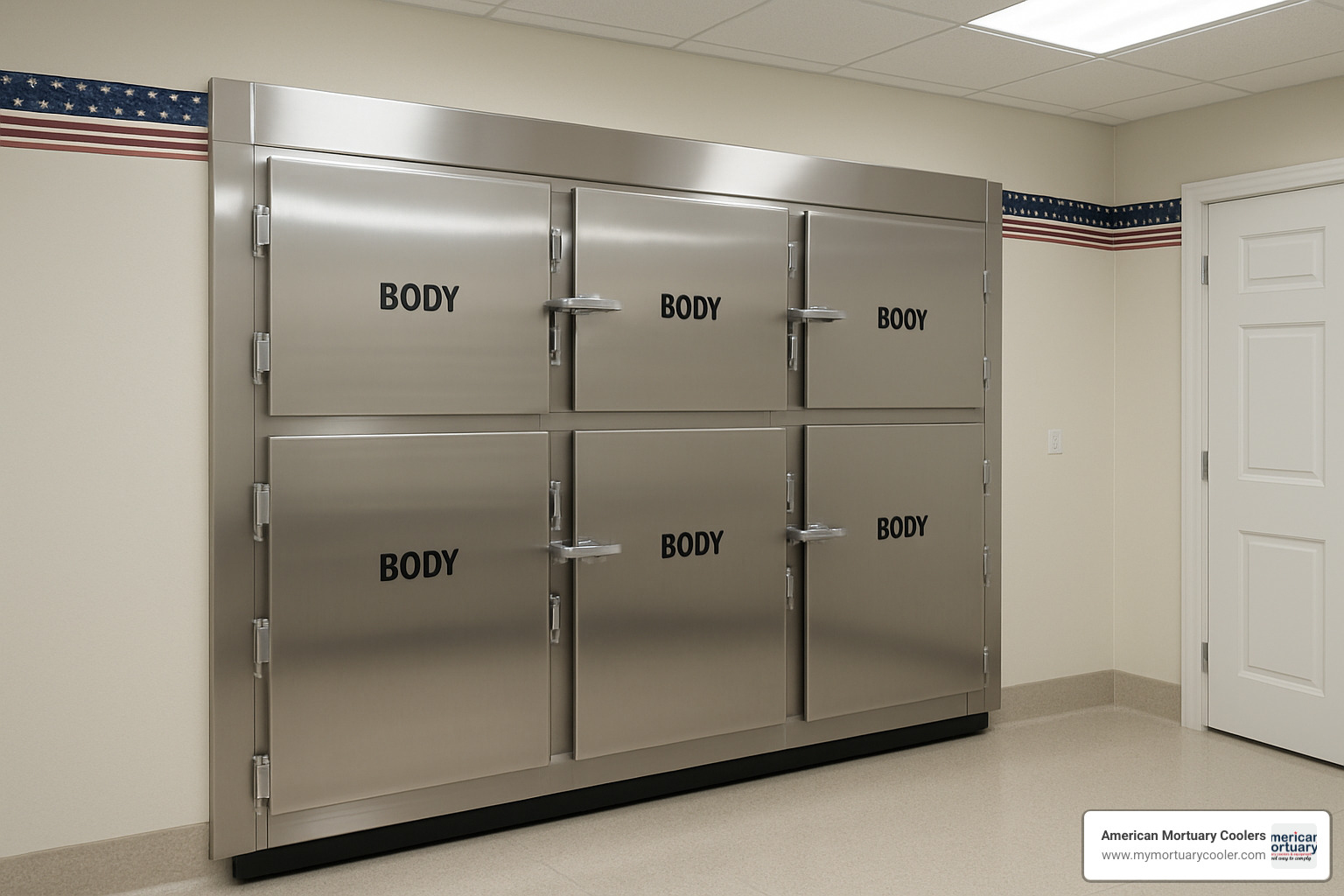
The heart of any preparation room is the mortuary cooler – specialized refrigeration units that preserve dignity by slowing natural processes until preparation can begin. These precision-engineered systems maintain the exact temperature needed to properly care for the deceased.
The right equipment transforms the physical demands of the job. Body lift systems like our Ultimate 1000 Lift have become a back-saver for many assistants. With a 1000-pound capacity, these systems allow one person to safely move a deceased individual without injury risk.
Embalming machines have evolved from basic pressure-pump systems to computerized units that precisely regulate flow and pressure of preservation fluids. This technology improves results and reduces chemical exposure.
The daily reality includes navigating preparation tables with built-in drainage, handling specialized instruments from arterial tubes to suture needles, and mastering transfer devices that protect both the deceased and caregiver.
"The tools have changed dramatically since I started," one funeral director told me. "But the purpose hasn't – we're still caring for families at their worst moment, just with better equipment."
Beyond equipment, mortuary assistants face unique workplace challenges:
Constant vigilance around infection control becomes second nature. Every procedure carries potential exposure to bloodborne pathogens, requiring meticulous attention to protective equipment and sanitization.
Even with modern equipment, ergonomic challenges persist. Many assistants develop specific techniques for positioning and movement to protect their bodies through decades of service.
Perhaps most challenging is the irregular schedule. Death observes no holidays or weekends. When a family needs care at 2 AM on Christmas morning, the mortuary assistant answers the call.
The emotional weight of regularly encountering grief, trauma and death requires strong coping mechanisms. Many successful professionals develop healthy emotional separation while maintaining compassion.
For those interested in learning more about supporting equipment, our guide on mortuary supplies and equipment covers everything from basic instruments to advanced systems.
Advancements & Industry Trends
The mortuary profession is evolving with technology and changing preferences. Today's mortuary assistant might use tablet computers for documentation where paper forms once ruled. Modern management software streamlines everything from case information to inventory tracking.
Training methods are changing too. Some programs now incorporate virtual reality simulations that allow students to practice embalming techniques before working with actual remains.
The rise of cremation (now exceeding 50% nationwide) has reshaped funeral service. As families increasingly choose this option, preparation rooms and staff responsibilities have adapted accordingly.
Growing interest in green burial options is creating new specialties. Mortuary assistants are learning alternative preservation methods and environmentally-friendly techniques for families seeking natural approaches.
Regulatory requirements continue to evolve. OSHA updates and changing state regulations mean ongoing education throughout one's career.
For fans of the popular indie horror game, excitement is building around the announced film adaptation of The Mortuary Assistant. This may further increase public curiosity about both the game and the real-world profession. Game enthusiasts can follow developments on the official Steam Store Page.
Emotional, Ethical & Legal Considerations
The life of a mortuary assistant isn't just about technical skills—it's a profession that touches the deepest human experiences of loss, grief, and dignity. Having supplied equipment to countless funeral homes, we've seen how these professionals steer complex emotional terrain while upholding strict ethical and legal standards.
Mortuary assistants operate within a web of regulations designed to protect both the deceased and their families. HIPAA confidentiality rules don't end when life does—privacy remains a sacred trust. Every transfer requires meticulous documentation to maintain proper chain of custody, ensuring families receive their loved ones.
OSHA bloodborne pathogen standards aren't just bureaucratic red tape; they're essential protections for professionals who work with the deceased daily. Many states also require specific licensing even for assistant roles.
Beyond legal requirements, this profession demands deep ethical commitment. Countless mortuary assistants share the same core value: every person deserves dignity in death, regardless of circumstances. This means treating homeless individuals with the same care as community leaders, and approaching religious or cultural traditions with genuine respect.
"The hardest part isn't the technical work," one assistant told me while we were installing a new cooler system. "It's maintaining your composure when a grieving mother breaks down, while still being human enough to show compassion." This delicate balance—professional yet compassionate—is the hallmark of excellent funeral service.
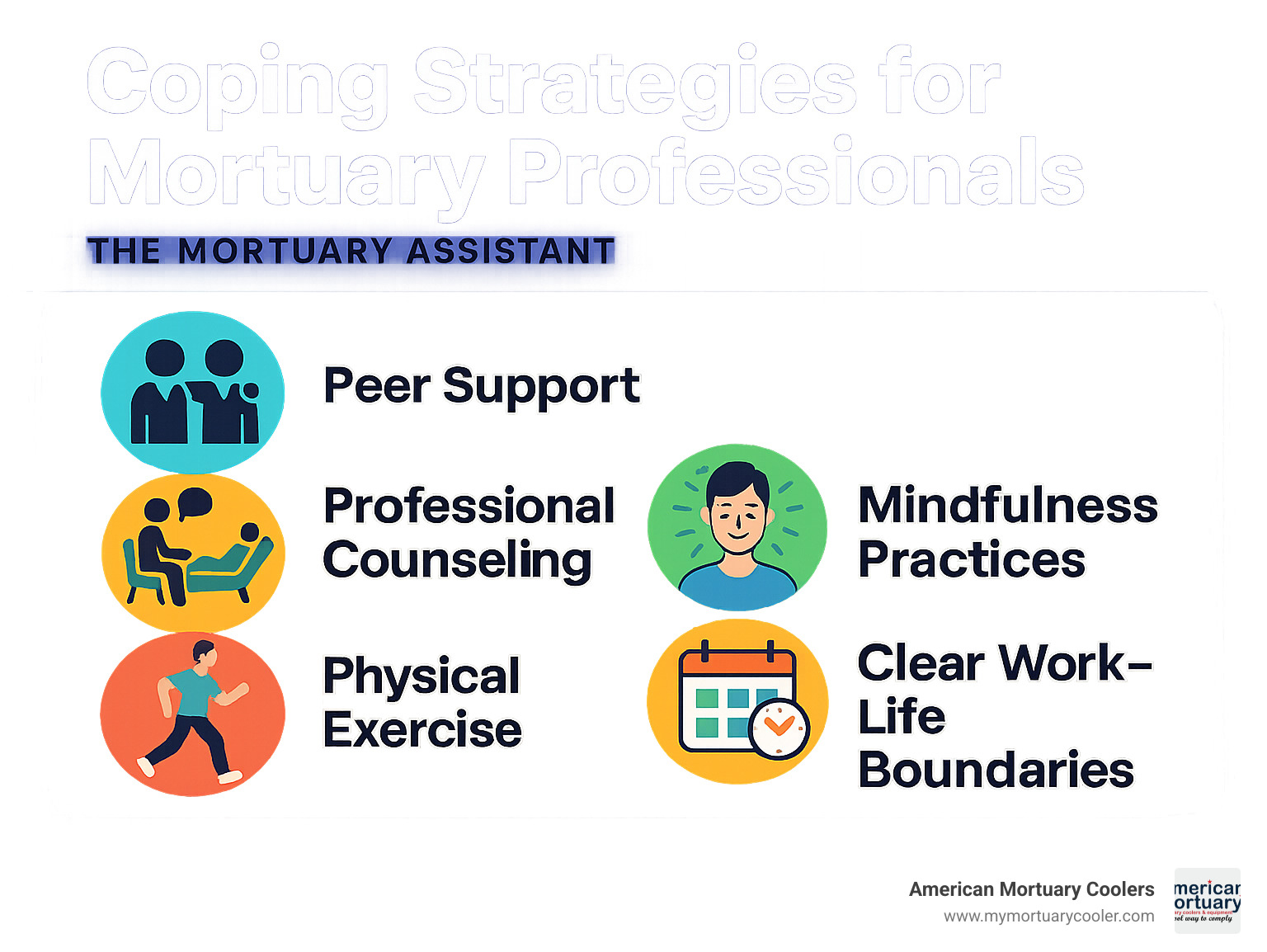
The emotional toll can be substantial. Working with victims of accidents, violence, or child deaths tests even the most resilient professionals. Compassion fatigue—that gradual erosion of empathy from continuous exposure to suffering—is a real occupational hazard. That's why successful mortuary assistants develop personal coping strategies.
Many find strength in peer support networks, connecting with colleagues who truly understand their experiences. Others benefit from professional counseling, increasingly offered by forward-thinking funeral homes. Some practice compartmentalization—being fully present at work but leaving those experiences behind when they clock out. Physical exercise, outdoor activities, and mindfulness practices help many process stress.
Career Growth, Salary & Outlook
The financial journey of a mortuary assistant typically begins modestly but offers several paths for growth. Entry-level funeral attendants earn a median salary of $29,150 annually (2020 data). With experience and additional credentials, embalmers can advance to a median of $42,780.
Those who pursue full licensure as morticians or funeral directors can reach a median of $54,100, while funeral home managers often command $74,200 or more. The progression requires deliberate skill development and often additional education.
Career advancement typically follows one of several paths. Many assistants pursue additional education to become licensed embalmers or funeral directors. Others develop specialized expertise in areas like restorative art, green burial practices, or cultural funeral traditions.
Leadership-minded professionals often move into supervisory roles before advancing to management positions. For the entrepreneurial, experience can eventually lead to opening their own funeral homes—though this requires business acumen alongside technical expertise.
The industry is experiencing some contraction, with the Bureau of Labor Statistics projecting a 4% decline in funeral service workers through 2029. This shift largely reflects changing consumer preferences, particularly rising cremation rates. However, impact varies by region—many rural areas and certain cultural communities maintain strong demand for traditional services.
Long-term success doesn't happen by accident. The most resilient careers are built on continuous learning and professional networking through organizations like the National Funeral Directors Association.
At American Mortuary Coolers, we're privileged to support these dedicated professionals with equipment that makes their challenging work easier—because we understand that behind every technical task is a human being committed to serving families during their most difficult moments.
Frequently Asked Questions about The Mortuary Assistant & Mortuary Careers
Is the gameplay in The Mortuary Assistant useful for training purposes?
Let's be honest - while the mortuary assistant game does include some surprisingly accurate embalming procedures, you won't be getting your mortuary license by logging hours on Steam! The game compresses hours-long procedures into minutes and, last I checked, most funeral homes don't require exorcism skills on their job applications.
That said, something unexpected has happened since the game's release. Many mortuary science educators have shared that the game has actually helped normalize conversations about death care professions. By bringing these careers into the mainstream (albeit with a supernatural twist), it's sparked genuine interest in people who might never have considered funeral service as a career path.
If you're seriously interested in mortuary work, you'll want to pursue proper education through accredited programs and apprenticeships with licensed professionals - no demons included!
What qualifications do I need to start as a mortuary assistant?
Breaking into the funeral industry as a mortuary assistant doesn't require an advanced degree, but there are some essential qualifications:
Most entry-level positions require a high school diploma or GED at minimum. You'll need to be at least 18 years old in most states (death care is understandably not a minor's game). Many funeral homes conduct background checks given the sensitive and trusted nature of handling someone's loved ones.
Physical capability matters too - while modern equipment helps tremendously, you'll still need to assist with moving and positioning the deceased. Previous experience in healthcare, customer service, or administrative roles can give you an edge, as these skills transfer nicely to the mortuary environment.
If you're looking to advance beyond the assistant role, you'll need to level up with an associate degree in mortuary science from an ABFSE-accredited program, complete a state-required apprenticeship (typically 1-3 years), pass your state licensing exams, and commit to continuing education to maintain your credentials.
How do mortuary assistants handle emotional stress on the job?
Working with the deceased and grieving families takes a unique emotional resilience. Mortuary assistants develop personal strategies to manage these challenges while still providing compassionate care.
The most successful professionals learn to establish healthy boundaries - being genuinely compassionate without absorbing everyone's grief. Many funeral homes foster supportive environments where staff can process difficult cases together. There's something powerful about having colleagues who truly understand the unique stresses you face.
Finding meaning in the work helps tremendously. When you frame each task as providing an essential service to families during their darkest hours, even the most challenging aspects of the job gain purpose.
Self-care isn't just a buzzword in this profession—it's essential. The mortuary assistants who thrive long-term develop consistent routines that might include regular exercise, non-work-related hobbies, time outdoors, mindfulness practices, and a clear separation between work and personal life. And yes, sometimes professional help is needed - many recognize when they need additional support and seek counseling.
The good news is that the funeral industry has increasingly acknowledged these challenges. Many larger firms now offer employee assistance programs specifically addressing the unique stresses that come with death care work. At American Mortuary Coolers, we've worked with countless funeral professionals over the years and have seen how important these support systems are for those dedicated to this essential profession.
Conclusion
The mortuary assistant brings together two fascinating worlds - a spine-tingling horror game and a meaningful real-world profession. Whether you've found yourself drawn to the game's unique blend of embalming procedures and supernatural frights, or you're genuinely curious about pursuing a career in funeral service, I hope this guide has illuminated both paths for you.
The game offers players a thrilling horror experience that, while taking creative liberties with the supernatural elements, does incorporate authentic aspects of mortuary procedures. With its clever system of randomized scares and multiple possible endings, it's no wonder it became an instant hit that continues to captivate players worldwide.
For those considering the actual career path, working as a mortuary assistant provides a chance to offer essential, compassionate care during families' most vulnerable moments. Yes, the work comes with emotional and physical demands, but many professionals find profound meaning in helping others steer grief with dignity and respect.
Here at American Mortuary Coolers, we take pride in supporting funeral service professionals across the nation. Based in Tennessee, we deliver our custom-built mortuary coolers and specialized equipment throughout the contiguous 48 states. Our team understands the unique challenges of mortuary operations from our locations in Johnson City, Atlanta, Chicago, and beyond.
We design our durable, custom solutions specifically to improve the efficiency and capabilities of preparation rooms nationwide. Our equipment is built to last, with the understanding that reliability is non-negotiable in your line of work.
If you're already working in the profession or considering it as your future path, I'd love to share more about how our resources and equipment options can support your important work. The right tools make all the difference in providing dignified care.
For more information about our custom mortuary coolers and equipment, please visit your one-stop shop for mortuary coolers.
Whether you're immersed in the game's atmospheric horror or dedicated to the real-world profession, the mortuary assistant offers a unique window into the essential, often overlooked work of caring for the deceased and supporting those left behind. It's work that happens largely out of public view, but remains vital to how we honor our loved ones and process our grief.


















